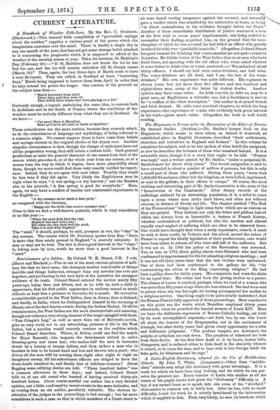CURRENT LITERATURE.
A Handbook of Weather Folk-Lore. By the Rev. C. Swainson. (Blackwood.)—This learned little compilation of "proverbial sayings about the weather" supplies a curious proof of the power which the imagination exercises over the mind. There is hardly a single day in any one month of the year, that has not got some strange belief attached to it concerning the prognostic which it is supposed to afford of the weather of the ensuing season or year. Take, for instance, St. Matthias's Day (February 24) :—" If St. Matthias does not break the ice he has lost his axe, and the ice will remain unbroken till St. Joseph comes (March 19)." Then, again, the last three days of March seem to have a very ill-repute. They are called, in Scotland at least, "borrowing -days," March being supposed to borrow them from April in order that he may extend his power the longer. One version of the proverb on the subject runs thus :— " March borrowed from April Three days, and they were ill;
They killed three lambs that were playing on a hill."
Curiously enough, a legend, embodying the same idea, is current both in Andalusia and in the South of France, where the conditions of the weather must be entirely different from what they are in Scotland. So we have:—
" rat passe Mars et Mareillon, Sans null Men alt coute ni vache ni taurillon."
These coincidences are the more curious, because they scarcely admit, as do the coincidences of language and mythology, of being referred to a common origin. We cannot suppose them to have come from beliefs and sayings current in the original abodes of the Aryan race. Another singular circumstance is that, though the change of style must have set all the prognostics wrong, they still retain a certain hold. Such general predictions as infer the general character of one season from that of the season which precedes it, or of the whole year from one season, or of a season from the way in which it begins, have more plausibility about them, though we never could find them very exactly verified by experi- ence. Indeed, they do not agree with each other. Possibly they would be less true if they did agree. Very likely the Englishman may be right when he says, "A wet spring,—a dry harvest ;" and the Russian also in his proverb, "A fine spring is good for everybody." Here, again, we may have a conflict of insular and continental experiences in -the English :— "A dry summer never made a dear peck,"
as compared with the German,
"Happy are the fields that receive summer rain."
Close to this we find a well-known quatrain, which is very consolatory to us this year :—
"When the sand doth feed the clay, England woe and well a day ! But when the clay doth feed the sand, Then it Is well with England."
The "sand," it should, perhaps, be said, prospers in wet, the "clay" in dry seasons. The reason which Mr. Swainson quotes from Ray, "there is more clay than sandy ground in England," is scarcely adequate. It may or may not be true. The fact is that a good harvest in the "clays" is, taking acre by acre, worth far more than a good harvest in the "sand."






























 Previous page
Previous page